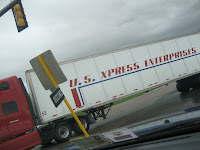Leigh picks me up at 8:30am and we drive out to the city of Roanoke, about two hours south, to visit the Phoenix Star Clubhouse. On the way I relate a story cousin James told me the night before. He was entering a car park, about to attend a meeting here in Charlottesville. He recognised the guy operating the barrier. He had been at high school with him. He spoke to the guy, and noticed he had slurred speech. He realised he knew why. He'd heard the story at University, through a mutual friend. This young guy had gone to University too, in Virginia. He'd been drinking one night and passed out on his bed. There had been a fire alarm and his friends, unable to wake him, had decided to carry him down stairs. On the way down his head had hit a step, but the guy had remained unconscious. When the fire alarm was finished they carried him back up stairs and put him back to bed. In the morning he didn't get up. His friends found they still couldn't wake him. For whatever reason they decided not to call an ambulance, but instead call his parents. His parents also, for whatever reason, decided not to call an ambulance. They drove an hour to pick him up themselves, and an hour back to Charlottesville to take him to the Emergency Room there, where they discovered an epidural haematoma. James recalled hearing about it, hearing that they guy had lost his speech and was relearning, remembered how he was told they had to take a part of his brain away. Massive scar. He says the reaction of the friends, and more so, that of his parents, was bizarre. But people don't know, do they, they don't have a sense of the connection between unconsciousness and physical damage to the brain. He said concussion was much better understood now in the US, especially within sports. Leigh knows the name of the University where the guy studied. She recognises the story. Cville is a small town. She says also that the University of Virginia has a reputation for dealing with neurological injury. Perhaps the parents thought this was the best thing to do, rather than letting their son go somewhere else.








Charles (in the background) tells me his mother was from Scotland. Glasgow, he thinks. He has never visited. He would like to but his sister tells him it's too far to travel.
I tell Kareem he has a light touch with the salad. Chefs look for that.
John E. likes to say 'hi' a lot. He says it every time he goes past Juanita's office, in a low voice. I quite like it.

I'm talking to Juanita. John S. comes in to wipe the computer screen and keyboard. It's on his task list for the day. Juanita tells me she is a person of faith. 'I'm here to serve these people, it's not about me.' It's not about any one person, she says. She tells me how they've only had to turn two people away. One of them was someone who thought they were better than everyone else. The other was someone who was taking drugs. She still feels bad about it. But you have to do what's best for the group. We talk about the Clubhouse standards, the things that define how the idea works (www.braininjuryclubhouses.net/standards.aspx). She says one of them is that a Clubhouse cannot be a place of employment - you can't pay members to work at anything within the premises or under it's auspices. I tell her this seems limiting, I don't understand it. She says it probably comes from the original Clubhouse system developed by people with psychiatric diagnoses. She says may be it's because they didn't want people with illnesses being taken advantage of, wanted to make sure Clubhouse managers couldn't profit from the labour of vulnerable people. I say that, by this standard, the venue we're thinking about in London might not be a Clubhouse. One of the things we're thinking about is having a place where people can get paid. A community venue run by people with brain injuries. Juanita agrees that the employment standards could be limiting. She says I should talk to Leigh about it, she's been involved in Clubhousing for much longer. She says I should also get in touch with Fountain House in New York City - that was the first, the original Clubhouse.
Me, Chris, Leigh. Chris tells me he is (was) a Paralegal. He worked locally. He has some trouble speaking. I meet his mother later, in the restaurant across the street.
Chocolate choc-chip with ganash glaze, cranberry with cream-cheese orange icing, Judge's Chambers, First Street, Roanoke. In the cafe across the street I learn about Roffing. It's a kind of deep tissue massage. Apparently it's very painful. Juanita mentions it because a person she knew was in an accident that caused his genitalia to be forced up into his abdomen. The Roffing was a means of helping to return them to their normal position. A lot of information to take in over cupcakes. I wonder if a Roffing would help untie some of the knots in my back that seem to have built up over the last week or so.
It's been raining every day since Saturday. There is thunder this evening and lightning pricks out the rain on the window while I sit at my computer.





















sounds like you're getting to the bottom of what a clubhouse is - but is that what we want? love the guy with the light touch on the salad!
ReplyDeleteI don't think it is exactly what we want, certainly not all we want. I'll have to look further wont I.
ReplyDelete